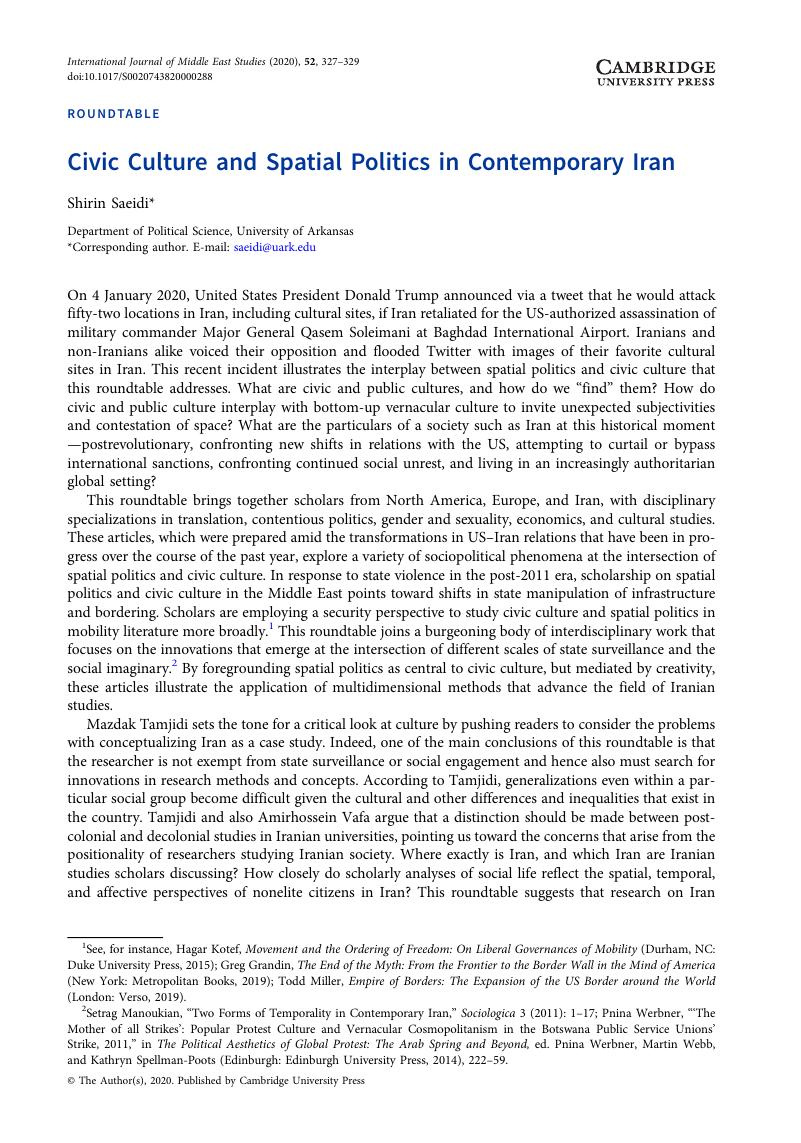No CrossRef data available.
Article contents
Civic Culture and Spatial Politics in Contemporary Iran
Published online by Cambridge University Press: 28 May 2020
Abstract

- Type
- Roundtable
- Information
- Copyright
- Copyright © The Author(s), 2020. Published by Cambridge University Press
References
1 See, for instance, Kotef, Hagar, Movement and the Ordering of Freedom: On Liberal Governances of Mobility (Durham, NC: Duke University Press, 2015)CrossRefGoogle Scholar; Grandin, Greg, The End of the Myth: From the Frontier to the Border Wall in the Mind of America (New York: Metropolitan Books, 2019)Google Scholar; Miller, Todd, Empire of Borders: The Expansion of the US Border around the World (London: Verso, 2019)Google Scholar.
2 Manoukian, Setrag, “Two Forms of Temporality in Contemporary Iran,” Sociologica 3 (2011): 1–17Google Scholar; Werbner, Pnina, “‘The Mother of all Strikes’: Popular Protest Culture and Vernacular Cosmopolitanism in the Botswana Public Service Unions’ Strike, 2011,” in The Political Aesthetics of Global Protest: The Arab Spring and Beyond, ed. Werbner, Pnina, Webb, Martin, and Spellman-Poots, Kathryn (Edinburgh: Edinburgh University Press, 2014), 222–59Google Scholar.
3 Manoukian, Setrag, “Where Is This Place? Crowds, Audio-Vision, and Poetry in Postelection Iran,” Public Culture 22, no. 2 (2010): 240CrossRefGoogle Scholar.
4 Sara Mourad, “The Naked Body of Alia: Gender, Citizenship, and the Egyptian Body Politic,” Journal of Communication Inquiry (2013): 1–17; Hafez, Sherine, Women of the Midan: The Untold Stories of Egypt's Revolutionaries (Bloomington, IN: Indiana University Press, 2019)CrossRefGoogle Scholar; Shirin Saeidi, “The Islamic Republic and Citizenship in Post-1979 Iran,” in Routledge Handbook of Citizenship in the Middle East and North Africa, ed. Zahra Babar, Roel Meijer, and James Sater (London: Routledge, forthcoming).
5 Braidotti, Rosi, “A Theoretical Framework for the Critical Posthumanities,” Theory, Culture & Society 36, no. 6 (2019): 31-61CrossRefGoogle Scholar.
6 Eva, Giraud, What Comes after Entanglement? Activism, Anthropocentrism, and an Ethics of Exclusion (Durham, NC: Duke University Press, 2019), 7Google Scholar.




